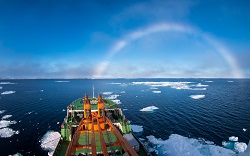Knowledge transfer creates sustainable Blue Growth
The Horizon 2020 COLUMBUS project addressed this challenge using knowledge transfer to unlock the potential of Europe’s coastline and seas. The EU is demanding improved systems and methodologies for knowledge capture and transfer and the illustration of demonstrable impact from funded research. Over the course of three years, COLUMBUS has illustrated measurable, sustainable ‘Blue Growth’ by focusing on creating impact from existing research; brokering knowledge; and, transforming how the marine and maritime community interacted and collaborated for mutual benefit. Seeing knowledge, as units The initiative created an extended transnational partnership representing all aspects of the research value chain, including funding bodies, researchers, communication experts and knowledge users. Project partners developed a step-wise, ‘COLUMBUS Knowledge Transfer Methodology’ based on the identification and collection of knowledge outputs. “Knowledge outputs are units of knowledge or learning generated by or through research activity and are not limited to new or pioneering discoveries but may also include new methodologies and processes, adaptations, insights, alternative applications of prior know-how and knowledge,” says project manager, Cliona Ní Cheallacháin. “The benefit of recognising research as individual units of knowledge, rather than a mass of findings presented in a report, is that it forces you to understand the knowledge outputs’ unique characteristics and potential applications. This then allows us to design a more targeted transfer plan, which increases the chance of impact being achieved.” Unlocking potential of existing research Strategic, coordinated and effective, this activity was completed in response to the increasing need at the European, national and regional level to justify significant investments in research. “The initiative focused on ensuring value creation from research. The project aimed to go beyond simply making knowledge accessible. It focused on mining funded projects for knowledge that had the potential to fill knowledge gaps and overcome bottlenecks and transferring this knowledge directly to target users to support the implementation of various marine strategies and policies,” explains Ní Cheallacháin. These include the Blue Growth Strategy, the Marine Strategy Framework Directive, the Marine Spatial Planning Directive, the revised Common Fisheries Policy, the Integrated Maritime Policy, the EU Strategy for the Atlantic, Marine Knowledge 2020 and many more. Building a cohort of knowledge transfer specialists Covering all regional sea basins in Europe, the consortium was formed around a core team of full-time knowledge transfer fellows each focusing on a specific sector, e.g. fisheries, marine biological resources, monitoring and observation. These fellows built their capacity through internal training and by sharing their experiences and insights, which meant the methodology could be adapted and refined. The combined efforts of the project team led to the review of just under 1 000 projects, the collection of almost 1 800 knowledge outputs and over 60 cases of successful knowledge transfer. “The project has resulted in many successful stories of activity thus proving that the COLUMBUS knowledge transfer methodology has real merit and can result in quantifiable impact,” says Ní Cheallacháin. “The methodology is available publicly for others to adopt.” Broader lessons and impacts In addition, COLUMBUS examined the feasibility of implementing knowledge transfer approaches into European and national funding systems. This resulted in a set of recommendations to funding agencies being delivered to the European Commission. It is intended that these will be released in the coming months. “The project generated a significant number of important outputs and provided a forum for stakeholder groups to collaboratively explore the barriers, challenges and solutions to increasing the impact potential of marine and maritime research,” Ní Cheallacháin concludes.
Keywords
COLUMBUS, marine, maritime, knowledge transfer, KT, Blue Growth, knowledge outputs, communication, impact, value creation

